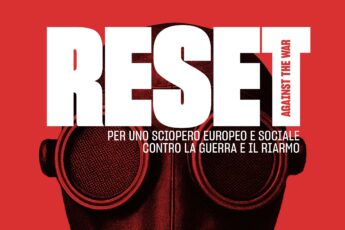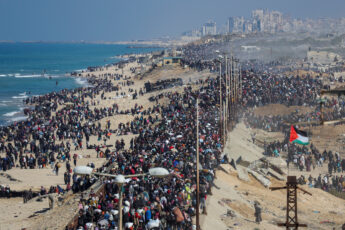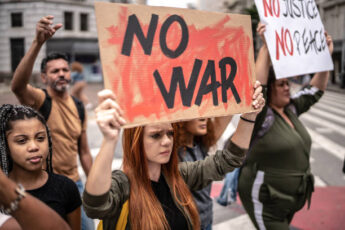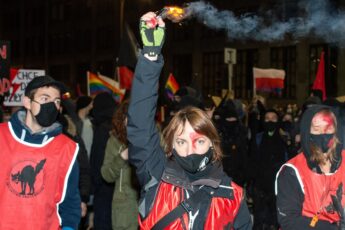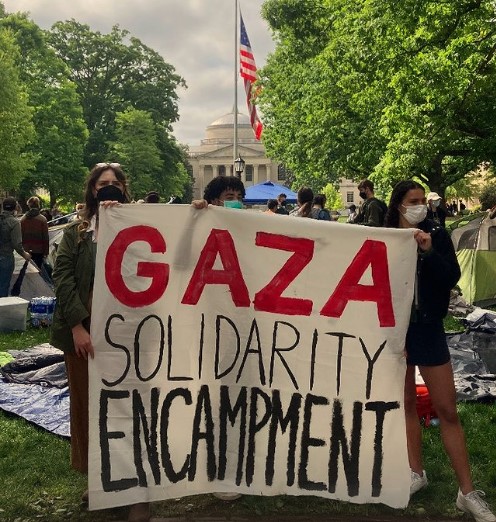
We publish an interview with Sylvie, a member of Students for Justice in Palestine and a PhD student at the University of North Carolina in Chapel Hill, where on Friday morning students set up a new encampment to protest against the genocide in Gaza and to demand that their university divest from companies involved with the Israeli government. It is only one among several encampments that have been spreading to countless U.S. campuses in the past week. Currently protests are going on throughout the country, from New York, where the mobilization involves not only Columbia but also N.Y.U., C.U.N.Y. and the New School, to Los Angeles, where the University of Southern California was forced to cancel its graduation ceremony. In most cases, students have been suffering a heavy repression by the police and by their universities. At Columbia, more than 100 students were arrested and most of them expelled, at the University of Texas in Austin the state troopers were sent to brutally disperse the protest, at Emory University in Atlanta the police targeted black students with tasers. Despite this reaction, the protest keeps growing, as Sylvie told us, increasingly drawing a connection between the denunciation of the massacre in Gaza to the struggle against war and militarization in the U.S. and worldwide.
TSS: In the last week protests against the genocide in Gaza have been spreading and are still spreading to several US campuses. Yesterday, you set an encampment here at the University of North Carolina in Chapel Hill. What are your goals? What are your demands to the university?
Sylvie: What we’re doing here at UNC is encased in the acknowledgment of what’s happening in Gaza, where 40.000 people have been killed with bombs that the US supplied to Israel. We are here at this university while there are no universities left in Gaza. Almost 100 university professors have been killed. With that said, we have had the same demands to our university since October, which are to disclose their investments in Israeli companies, which directly profit from apartheid. We have specific companies in which UNC has investments, like Sabra Dipping Company, Caterpillar, Intel, Hewlett-Packard and so on. And of course the disclosure has to come with the divestment, and we mean total divestment. Then we have also other demands like creating an independent democratic commission to hold the university accountable and to ensure that there are consequences to not divesting. And we also demand that the university stops discriminating against Palestinian and Palestinian-affiliated students.
Of course divestments would involve a lot of money, millions of dollars, since investments in Israeli companies can amount to 5% of the university’s endowments, which are huge. At the same time, it is a drop in the bucket, so there is clearly an ideological component to the demand for divestment. The goal is to show that Western knowledge institutions are literally built upon white supremacy. The buildings here were constructed by enslaved people in the 18th century: the white supremacy is physically built into this university. And these demands feel impossible and the university is making them so hard to fulfill precisely because they’re unwilling to admit the Palestinian people are human beings. So, there’s a material side to the demand, but it also requires an ideological shift. The problem is how can we contribute to a movement that not only materially divests from these companies, but also ideologically pushes for humanity.
TSS: You already tried last week to set an encampment. How did the university react and what kind of repression did you face if you did so?
Sylvie: Last week’s encampment wasn’t intended to be permanent from the start. It was an attempt to provide a quick autonomous response to the facts at Columbia, where the fascists were taking off their masks, so to speak. The encampment that started today instead required far more planning and is created to last, to be sustainable over time, to put roots in the ground. Our morale is high. Not only students are participating but also professors, they are here with their kids. We want to continue until our demands are met, but the plan will be very contextual. Divestment is the goal. Liberation is the goal.
TSS: Are you trying to coordinate with other U.S. campuses? Do you have a communication with them?
Sylvie: There’s a lot of stuff happening around. There was a rally at Duke University this morning, there are students from other universities in North Carolina coming here. The formal coordination with other campuses is not very strong, but for sure we are coordinated in our demands, in our goals and in our vision for the world generally. The most interesting thing is to see encampments being set up everywhere sort of autonomously, and the whole protest constantly expanding.
TSS: In the South there are also other struggles going on, like the current wave of unionization and labor organizing. Do you plan to connect to other struggles?
Sylvie: Yes, as SJP we are organizing in concert with the local union of graduate student workers and with the union for university staff workers. Together with them we will participate in a demonstration on May 1st which will be a workers’ rally for Palestine. More broadly, our struggle is also an abolitionist struggle, it is a struggle against colonial violence in whatever forms it manifests itself. We know for a fact that every city in North Carolina and across the country gives taxpayer dollars to Israel. That is a very strong, opaque line that we can draw. And then we know that police departments like in Atlanta have training programs in Israel with the Israeli Defence Forces, where they mutually train each other on how to dominate minoritized populations. So we draw that connection, we realize that the struggle for Palestine is connected to our struggle against police violence here, for example against what we see at Emory happening against students, with black students being tased by cops trained by the IDF. What’s cool about this particular moment is that people’s political consciousness is connecting those dots. As Angela Davis said, Palestine is a litmus test for all liberation struggles and I think this is very true. It’s a struggle that is very local and very international at the same time.
TSS: For months now, the Israeli army’s massacre of civilians in Gaza has been materially supported by the Biden administration, despite the protests that have been going on for months. What do you think could be the political consequences of this in the United States?
Sylvie: This is me speaking personally and not necessarily as a member of SJP, but fuck Biden. He needs to be tried at the Hague. He has blood all over his hands. People in his administration are resigning, but that needs to be happening in droves. And a recent commission by the legal scholar Noura Erakat has shown that the Biden administration’s continual investment in Israeli weapons or weapons for Israel is actually against our own laws, that they are breaking not only international law, but also U.S. laws as well. I’ve heard discourses saying that if Joe Biden wants to win, he needs to support a ceasefire, but where are our priorities here? I think people have begun to abandon him.
TSS: In the past days we have seen politicians from all sides turning against the students’ protests, accusing them of antisemitism. How do you react to that?
Sylvie: I don’t want to really engage with this, because it is not a serious accusation. The person leading the chants in this very moment is Jewish. There are a lot of Jewish students participating and organizing these protests. This is not to say that anti-Semitism doesn’t exist, but to say that anti-Semitism and anti-Palestinian racism are symptoms of the same disease that we need to be fighting together.
TSS: The protests’ in U.S. campuses are increasingly describing themselves not only as pro-Palestinian but also as anti-war, and we know that the genocide in Gaza is part of a broader and escalating scenario of war that involves not only the Middle East but also Ukraine and Europe, something that day after day looks increasingly as a Third World War. What do you think can be the role of students in opposing this war scenario?
Sylvie: I think we have a lot to take from past generations of antiwar student protestors, like those against the war in Vietnam. Even if it took a shamefully long amount of time to do it on the part of the U.S. government, the political will to actually stop the draft and to get people out of Vietnam was a consequence of massive students’ mobilizations, not just in the U.S. but across the globe. I am thinking about Latin America and the student protests there against the militarization of schools and life in general. We have a lot to learn from them. Or if we think of protests against apartheid in South Africa in the 1980s and 1990s. We have a lot to learn there. I think students can play a huge role. Universities are places of knowledge production and knowledge transmission. And we are here because we have access to information and we have eyes to understand what’s happening around us. So, yes, students play a huge role.


